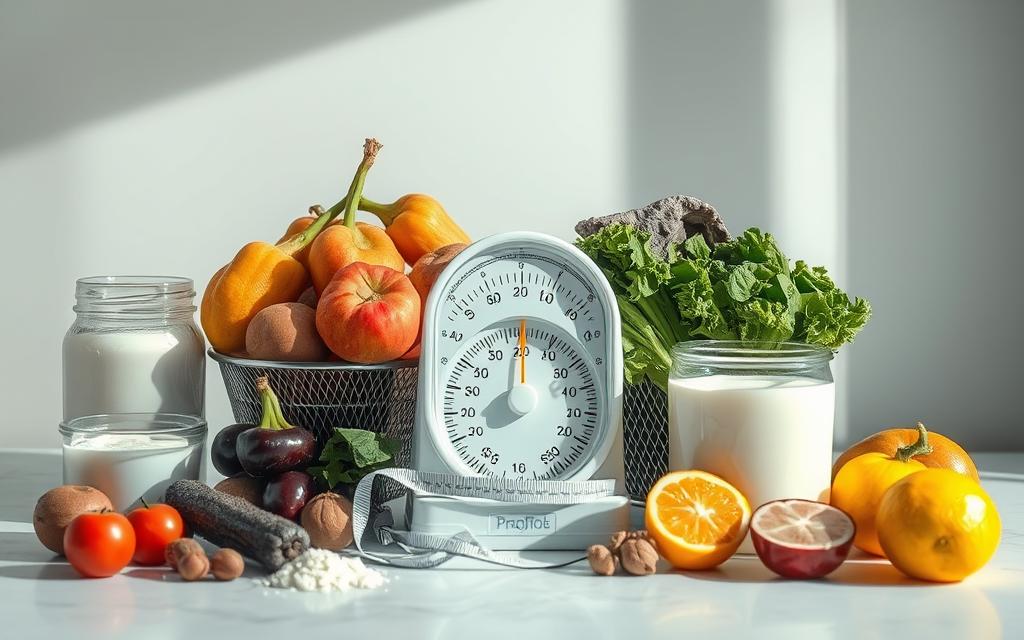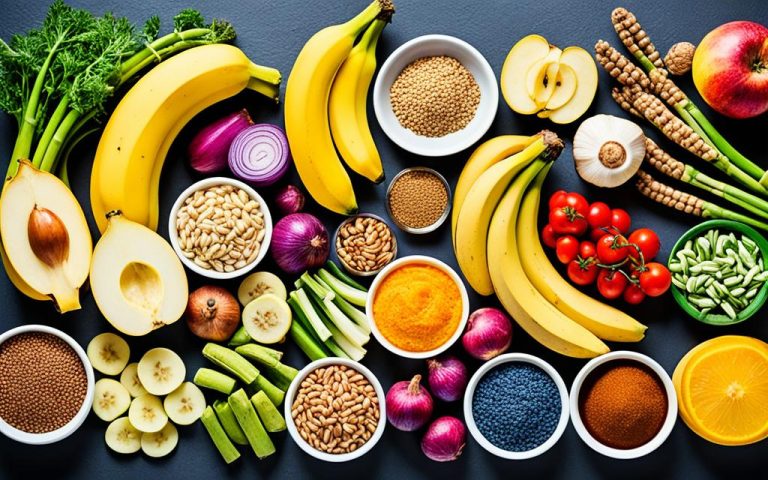Probiotics for Weight Loss: Your Guide to Success
Struggling to lose weight? Probiotics might be the answer. These tiny helpers are key to a healthy gut and can aid in weight control. Let’s dive into how probiotics can help you on your path to better health.
Studies show probiotics can help with weight management. A 2013 study found women taking Lactobacillus rhamnosus lost more weight than those on a placebo, about 1.8 kilograms (four pounds) more1. This shows probiotics could be a useful tool for losing weight.
When picking a probiotic for weight loss, look for Lactobacillus and Bifidobacterium strains. The mindbodygreen probiotic+ is a top choice, with 32 billion CFU and Bifidobacterium lactis B420, which helps control body fat and shrink waist size2.
Remember, probiotics aren’t a quick fix. A 2021 review pointed out they work best with a calorie-reduced diet and more exercise1. So, use probiotics as part of a full plan for weight management.
Key Takeaways
- Probiotics may support weight loss efforts
- Lactobacillus rhamnosus has shown promising results in weight loss studies
- Look for probiotic supplements with common strains like Lactobacillus and Bifidobacterium
- Combine probiotics with a healthy diet and exercise for best results
- The gut microbiome plays a role in weight management
- Choose high-quality probiotic supplements with third-party certifications
Understanding Probiotics and Their Role in Health
Probiotics are key to gut health and have become more popular lately. They are beneficial bacteria that help keep you healthy. They support digestion and boost your immune system.
What are probiotics?
Probiotics are live microorganisms found in your gut. They are called “good” bacteria because they keep your gut healthy. You can find them in foods and supplements. The Lactobacillus and Bifidobacterium types are well-studied and recommended3.
How do probiotics work in the body?
Probiotics help balance the gut bacteria. They increase the variety of microbes in your digestive system, which is key for good health. These beneficial bacteria help your immune system by making antibodies and boosting immune cell activity4.

The importance of gut health
A healthy gut is crucial for many body functions. It helps with digestion, absorbing nutrients, and fighting off bad pathogens. Studies show a link between gut bacteria and belly fat, showing the need for a balanced gut for weight control5.
“The gut microbiome is like a hidden organ, silently influencing our health in countless ways.”
| Probiotic Benefits | Impact on Health |
|---|---|
| Balanced gut microbiome | Improved digestion and nutrient absorption |
| Enhanced immune function | Better defense against pathogens |
| Reduced inflammation | Lower risk of chronic diseases |
| Improved mental health | Better mood and cognitive function |
Learning about probiotics and their health benefits helps you make smart choices for your diet. Adding them through fermented foods or supplements is a natural way to support your gut and overall health.
The Connection Between Gut Health and Weight Management
Your gut microbiome is key to managing your weight. Recent studies have found interesting links between gut bacteria and metabolism and fat storage. This knowledge can help you manage your weight better.
The types of bacteria in your gut affect how your body handles food and fat. People who are obese often have fewer and different gut bacteria than those who are at a healthy weight6. This can change how well your body uses energy from food, leading to more calorie absorption and weight gain7.
Some gut bacteria, like those in the Prevotella group, are linked to losing weight on calorie-controlled diets6. Also, many “good” gut bacteria are found in people with lower weight and less belly fat6. This means keeping a healthy balance of gut bacteria is important for managing weight.
The gut microbiome does more than just affect calorie use. It also changes your appetite and metabolism. Certain probiotics can change the levels of hormones that control hunger and fullness7. An unbalanced gut microbiome can cause chronic inflammation, leading to insulin resistance and metabolic syndrome, which are linked to obesity7.
To keep your gut microbiome healthy and help with weight management, eat foods rich in probiotics. Foods like fermented foods, onions, leeks, garlic, and whole grains are good choices6. Focusing on gut health can be a big help in managing your weight.
| Gut Health Factor | Impact on Weight Management |
|---|---|
| Bacterial Diversity | Influences calorie extraction and fat storage |
| Specific Bacteria Types | Associated with weight loss success |
| Appetite Regulation | Affects hormone production controlling hunger |
| Inflammation | Can lead to insulin resistance and obesity |
How Probiotics May Influence Weight Loss
Probiotics are key in managing weight by affecting many body processes. They can boost your fat burning and keep lean muscle mass. Let’s see how probiotics can help you lose weight.
Reducing Fat Absorption
Probiotics can cut down how much fat your body takes in. Some types of bacteria might help shrink your waist and support weight loss8. They make short-chain fatty acids, which help with sugar use and energy8.
Regulating Appetite Hormones
Your gut bacteria affect hormones like ghrelin and peptide YY that control hunger. Probiotics can balance these hormones, making you feel full longer. A study showed men on probiotics gained less weight and fat on a high-fat diet than those on a placebo9.
Decreasing Inflammation
Probiotics can lower inflammation linked to obesity and metabolic issues. This anti-inflammatory effect helps with weight control. Studies show probiotics can cut down body fat, waist size, and BMI9.
| Probiotic Effect | Impact on Weight Loss |
|---|---|
| Increased SCFA-producing bacteria | Enhanced fat burning |
| Improved insulin sensitivity | Better blood sugar control |
| Regulated pro-inflammatory genes | Reduced inflammation |
A study on obese Egyptian women found probiotics, with diet and exercise, changed gut bacteria. It boosted good bacteria like Lactobacillus and Bifidobacteria, linked to losing weight10.
Probiotics look promising for weight control, but their results can differ. This depends on dosage, how long you take them, and your own health8. Always talk to a doctor before starting any new supplements.
Research on Probiotics for Weight Loss
Scientists have looked into how probiotics help with weight control. A study focused on overweight adults and their response to probiotics. It had 81 people aged 18-45 with extra weight. Those who took a higher dose of probiotics lost about 1.93 ± 3.70 kg11.
The main goal was to see how much weight people lost. They also looked at BMI, waist size, and blood pressure. The idea was that more probiotics would lead to more weight loss11.
Probiotics help with weight management in more ways than just losing weight. People with obesity often have fewer types of gut bacteria. This could affect how well they control their weight12.
Not every study shows the same results, though. A recent study on synbiotics didn’t find a big effect on weight or body shape. Yet, probiotics might still change the good bacteria in the gut, which is good for health13.
| Study Focus | Key Findings |
|---|---|
| Weight Loss | 1.93 kg decrease with double probiotic dose |
| Gut Diversity | Decreased in individuals with obesity |
| Synbiotics | No significant impact on weight loss |
These studies show how complex the link between probiotics and weight is. Even with varying results, probiotics could help with gut health. This might help with weight control indirectly.
Effective Probiotic Strains for Weight Management
Some probiotic strains have shown great promise in helping with weight loss. Let’s look at the top strains that can help you manage your weight.
Lactobacillus gasseri
Lactobacillus gasseri is a top choice for losing weight. Studies show it can cut down body weight, BMI, waist size, and body fat. It’s especially good at reducing belly fat.
Bifidobacterium breve
Bifidobacterium breve is known for its role in weight management. A study found it helped with weight control and lowered inflammation. This shows Bifidobacterium strains are key for a healthy weight.
Lactobacillus rhamnosus
Lactobacillus rhamnosus has been proven effective in weight loss. In a 6-month study, it helped adults with weight issues lose more weight than a placebo group. It also helped obese people keep off the weight they lost14.
| Probiotic Strain | Key Benefits | Study Duration |
|---|---|---|
| Lactobacillus gasseri | Reduces body weight, BMI, waist circumference, body fat | 12 weeks |
| Bifidobacterium breve | Aids weight management, reduces inflammation | Varies |
| Lactobacillus rhamnosus | Promotes weight loss and maintenance | 6 months |
Remember, these probiotics work best with a healthy diet and exercise. Always talk to a healthcare professional to find the right probiotics for you.
Sources of Probiotics: Foods vs. Supplements
Probiotics are good bacteria that help keep your gut healthy. You can get them from foods or supplements. Let’s look at both to help you choose what’s best for your weight management.
Fermented foods are great for getting probiotics. Foods like yogurt, kefir, sauerkraut, and kimchi are good choices. They help with bone, heart, and gut health, and can also help with weight management15.
Other foods rich in probiotics include tempeh, miso, kombucha, and certain cheeses. These foods give you probiotics and extra nutrients like vitamins, minerals, and fiber15.
| Probiotic Food | Benefits |
|---|---|
| Yogurt | Improved bone health, reduced risk of diabetes |
| Kefir | Aids digestive problems, good for lactose intolerance |
| Sauerkraut | Rich in fiber, vitamins C and K, iron, and potassium |
| Kimchi | High in vitamins and minerals, benefits digestive health |
Probiotic supplements are another way to get these beneficial bacteria. They usually have more of certain strains and can have 1 to 50 billion CFU per dose16. Common types in supplements include Lactobacillus, Bifidobacterium, and Saccharomyces16.
When deciding between probiotic foods and supplements, think about your lifestyle and what you like to eat. Mixing both can help with weight loss. Start with small amounts of probiotic foods and slowly increase them to avoid side effects like bloating or cramping17.
Remember, eating prebiotic and probiotic foods together in one meal can boost your gut health17. If you’re thinking about probiotic supplements, talk to a healthcare provider to find the best one for you.
Kefir Lab’s Probiotic Products for Weight Loss Support
Kefir Lab offers a variety of probiotic products to help with gut health and weight management. Their products include probiotic shots and coconut kefir. These are full of good bacteria to improve your digestive system.
Studies show that probiotics like those in Kefir Lab’s products can help with weight loss18. These products aim to improve gut health, which is key for managing weight. In fact, 85% of Kefir Lab customers felt more energetic after adding kefir to their daily routine18.
The probiotic shots from Kefir Lab are easy to use and powerful. They’re great for busy people, making sure you get your daily probiotics. For those who can’t have dairy, the coconut kefir is a good choice. It’s full of probiotics and okay for people who are lactose intolerant.
| Product | Benefits | Customer Satisfaction |
|---|---|---|
| Probiotic Shots | Convenient, potent | 90% positive results within a month18 |
| Coconut Kefir | Dairy-free, rich in probiotics | 70% reported decreased digestive discomfort18 |
Kefir Lab’s probiotic kefir has 30% more live active cultures per serving than other brands18. This means it could offer better health benefits and help you lose weight more effectively.
Best Practices for Using Probiotics for Weight Loss
Adding probiotics to your weight loss plan can really help. Let’s look at how to use them best for your health and weight goals.
Dosage and Timing
Being consistent is important. Try to take probiotics every day, especially with meals. This helps them stay in your system longer. It usually takes 8-12 weeks of regular use to see weight loss results19.
Combining Probiotics with a Healthy Lifestyle
Using probiotics with a diet full of fiber and exercise can boost their effects19. A healthy gut is key for your overall health, nutrition, and mood20. Add foods like yogurt, kefir, and sauerkraut to your meals.
Monitoring Progress
Keep an eye on how you’re doing and tweak your probiotic plan if needed. Some studies show that certain probiotics, like Lactobacillus rhamnosus, help women lose more weight20. If you’re not seeing changes, try different types or increase your probiotic intake.
| Probiotic Strain | Potential Weight Loss Benefit | Recommended Daily Intake |
|---|---|---|
| Lactobacillus gasseri | 8.2-8.5% reduction in belly fat over 12 weeks | 1-10 billion CFU |
| Lactobacillus rhamnosus | Increased weight loss in women | 1-10 billion CFU |
| Lactobacillus fermentum | 3-4% body fat loss in 6 weeks | 1-10 billion CFU |
Probiotics work best with a healthy diet and regular exercise. Try different probiotic products to see what works best for your weight loss goals21.
Probiotics for Weight Loss: What to Expect
Starting your probiotic journey for weight loss? It’s important to know what to expect. You’ll see changes in gut health right away, but the results may take time to show.
At first, you might feel better digestion and less bloating. These signs show that probiotics are working. As your gut gets healthier, you’re on your way to possibly losing weight.
Research shows probiotics can help with weight loss in different ways. They might lower fat absorption and make you feel less hungry by increasing certain hormones22. This could lead to slow but steady weight loss.
Studies have shown big drops in BMI and body fat when people ate yogurts with probiotics. Those who were overweight or obese and ate probiotic yogurt lost more weight and had smaller waists than others23.
Being consistent is crucial. Add probiotics to a healthy diet and regular exercise for the best results. Everyone is different, but many start seeing changes in a few weeks to months. Keep up with your gut health journey and stay patient!
Potential Side Effects and Precautions
Probiotics are usually safe, but it’s good to know about possible side effects. Some people might feel gas, bloating, or diarrhea when they start taking probiotics. These symptoms usually go away in a few days or weeks as your body gets used to them24.
Some people might get skin rashes or itchiness from probiotics. If you have severe or ongoing side effects, see your doctor right away24.
If you have a serious illness or a weak immune system, be careful with probiotics. A 2017 review found that these groups might want to avoid probiotics to lower infection risks24.
People with slow gut movement might face issues with small intestine bacterial overgrowth (SIBO) from probiotics. Stopping probiotics and taking antibiotics could help with SIBO symptoms24.
| Probiotic Consideration | Recommendation |
|---|---|
| Minimum CFU concentration | 106 (1,000,000) viable CFU per gram |
| Recommended daily dose | 108–1011 (100,000,000-100,000,000,000) CFU |
| Duration of use | Less than 8 weeks for optimal effectiveness |
Probiotics are usually safe, but it’s smart to talk to a healthcare professional before starting them, especially if you have health issues or take other medicines25.
Combining Probiotics with Other Weight Loss Strategies
Probiotics can help you lose weight when used with other effective strategies. A good plan includes eating well and staying active. This way, probiotics work better.
Dietary Considerations
Eating a balanced diet helps your probiotics and gut health. Eat foods high in fiber like fruits, veggies, whole grains, and lean meats. These foods feed the good bacteria in your gut19.
Adding foods like yogurt, kefir, sauerkraut, and kimchi to your diet is good too. They give you more probiotics. This helps keep your gut diverse, which is key for managing weight19.
Exercise and Physical Activity
Exercise is vital for losing weight. It burns calories and helps your gut by making your microbiome diverse. Try to do at least 150 minutes of moderate exercise or 75 minutes of hard exercise each week.
When you exercise and take probiotics, you can lose more body fat. Studies show that some probiotics help with weight loss when you’re active1926.
| Strategy | Benefits | Implementation Tips |
|---|---|---|
| Balanced Diet | Supports gut health, provides nutrients for probiotics | Include fiber-rich foods, fruits, vegetables, and lean proteins |
| Physical Activity | Burns calories, promotes gut microbiome diversity | Aim for 150 minutes of moderate exercise per week |
| Probiotic Supplementation | Enhances gut health, supports weight loss | Choose high-quality supplements with specific weight loss strains |
For lasting weight loss, combine diet, exercise, and probiotics. Keep taking your probiotics and wait 8-12 weeks to see results19.
Using probiotics with a balanced diet and regular exercise sets you up for success. This approach helps you keep a healthy weight for the long term.
The Role of Prebiotics in Supporting Probiotic Efficacy
Prebiotics are key to making probiotics work better. They are fibers that feed good gut bacteria, helping them thrive. When you mix prebiotics with probiotics, you get synbiotics. This combo boosts health benefits, like helping with weight loss.
Studies show a diverse gut microbiome is vital for health and managing weight. People who are obese often have fewer types of gut bacteria than those who are not obese27. Eating prebiotics can increase the good bacteria in your gut. This might help fight obesity and boost your immune system28.
Foods high in fiber are great for prebiotics. Here are some top picks:
- Garlic
- Onions
- Leeks
- Asparagus
- Bananas
Eating these foods helps good bacteria grow. It’s crucial to eat both prebiotic and probiotic foods for a healthy gut28.
Prebiotics come in different types, like xylooligosaccharides (XOS), galacto-oligosaccharides (GOS), and inulin. GOS is safe and helps balance gut bacteria, supporting beneficial bacteria29. Inulin, found in many plants, can replace fats or carbs in food. It boosts the immune system and acts as a prebiotic29.
Prebiotics have many benefits, but talk to a doctor before adding them to your diet. Some people might get worse symptoms like SIBO or IBS from prebiotics28.
Knowing how prebiotics work can help you use them wisely. This can make probiotics work better and support your weight loss goals.
Long-term Benefits of Probiotics Beyond Weight Loss
Probiotics do more than help with weight loss. They are key to your overall health. They boost your immune system, help you absorb nutrients better, and support your mental health30.
Research shows that the types of bacteria in your gut affect your health. For example, the gut bacteria of twins with different weights can change how mice metabolize food30. This shows how probiotics could help with weight issues.
Probiotics also help with mental health. They can change how you feel anxious, linking your gut and brain30. This area of study is new but promising for mental health care.
| Probiotic Benefit | Impact on Health |
|---|---|
| Improved Gut Health | Enhanced nutrient absorption, better digestion |
| Boosted Immune Function | Increased resistance to infections, reduced inflammation |
| Mental Health Support | Potential reduction in anxiety, improved mood |
| Metabolic Health | Better regulation of blood sugar, improved lipid profile |
Using probiotics long-term can make you healthier. They help with weight, fight off diseases, absorb nutrients, and keep your mind balanced. Adding probiotics to your daily routine is a smart move for your health.
Choosing the Right Probiotic Supplement for Your Needs
Finding the right probiotic supplement for weight management can be hard. With many options, it’s key to focus on what makes a product work well. Let’s look at what to consider when picking a probiotic supplement.
Key factors to consider
When looking for probiotics, check the strains included. Choose ones like Lactobacillus, Bifidobacterium, Bacillus, or Saccharomyces boulardii31. These have been shown to help with digestion and might help with weight loss. Also, make sure the product has at least 1 billion CFUs for effectiveness31.
Reading labels and understanding CFU counts
Read labels carefully to see the probiotic strains and CFU count. Since the supplement industry isn’t strictly watched by the FDA, third-party testing for quality is important31. Brands like Align have gained trust through years of research and doctor recommendations32. Look for products that also have prebiotics to feed good gut bacteria and boost effectiveness.
Remember, probiotics help with weight loss but work best with a whole approach. Pair them with a diet full of prebiotic foods like beans, garlic, and certain fruits31. If you have health concerns, talk to your doctor before starting any new supplements to make sure they’re safe for you.
FAQ
What are probiotics, and how do they work in the body?
Probiotics are live microorganisms that help our health when eaten in the right amounts. They keep our gut bacteria balanced, which is key for a strong immune system. By doing this, they support a healthy gut microbiome. This is vital for digestion, absorbing nutrients, and staying healthy.
How can probiotics help with weight loss?
Probiotics affect many body functions, like how we process food, store fat, and control hunger hormones. They can help with weight loss by cutting down on fat absorption, making short-chain fatty acids that help with fat metabolism, and affecting hunger hormones. They also reduce inflammation linked to obesity and metabolic issues.
What are some effective probiotic strains for weight management?
Certain strains like Lactobacillus gasseri, Bifidobacterium breve, and Lactobacillus rhamnosus are good for managing weight. Lactobacillus gasseri helps reduce belly fat and total body weight. Bifidobacterium breve prevents weight gain and lowers body fat. Lactobacillus rhamnosus is linked to losing weight and better body composition.
Should I get probiotics from foods or supplements?
You can get probiotics from foods like yogurt, kefir, sauerkraut, and kimchi, or from supplements. Supplements offer a convenient way to get more specific strains. Both have their benefits, and mixing food and supplements can help you get the most out of probiotics for losing weight.
How long does it take to see results from using probiotics for weight loss?
Seeing the effects of probiotics on weight loss can take weeks to a few months. It’s important to be consistent. Adding probiotics to a healthy diet and regular exercise can improve results. You might first notice better digestion and less bloating, then see weight loss and better body shape over time.
Are there any potential side effects of taking probiotics?
Most people find probiotics safe, but some might get gas, bloating, or stomach upset at first. These usually go away as your body gets used to them. Always choose high-quality supplements and talk to a doctor before starting, especially if you have health issues or take other medicines.
How can I maximize the benefits of probiotics for weight loss?
Probiotics work best with a healthy lifestyle, like eating a balanced diet full of fiber, fruits, veggies, whole grains, and lean meats, and staying active. Combining probiotics with a calorie deficit through diet and exercise can lead to better and lasting weight loss.
What are prebiotics, and how do they support probiotic efficacy?
Prebiotics are fibers that feed good gut bacteria, making probiotics work better. Using prebiotics with probiotics (synbiotics) helps create a better environment for good bacteria. Foods high in prebiotics include garlic, onions, leeks, asparagus, and bananas.
How do I choose the right probiotic supplement for weight loss?
When picking a probiotic supplement, think about the strains known for weight loss (like Lactobacillus gasseri, Bifidobacterium breve), CFU count, and quality testing. Choose products with a high CFU count and strains proven for weight loss. Reading labels and understanding CFU counts helps you make a good choice.
Source Links
- https://www.womenshealthmag.com/weight-loss/a19940475/probiotics/ – This Is What You Can Actually Expect From Taking A Probiotic To Help With Weight Loss
- https://www.healthline.com/nutrition/best-probiotics-to-support-weight-loss – 5 Best Probiotics for Weight Loss in 2024
- https://my.clevelandclinic.org/health/treatments/14598-probiotics – What Are Probiotics & What Do They Do?
- https://www.bjc.org/news/probiotics-and-prebiotics-what-you-need-know-balanced-gut – Probiotics and prebiotics: What you need to know for a balanced gut – BJC HealthCare
- https://zoe.com/learn/probiotics-and-weight-loss – Probiotics and Weight Loss: How and Why They Work
- https://zoe.com/learn/gut-health-and-weight-loss – Gut Health and Weight Loss: Do Gut Bacteria Play a Role?
- https://momentuminjury.com/the-connection-between-gut-health-and-weight-loss/ – The Connection Between Gut Health and Weight Loss
- https://www.webmd.com/diet/what-to-know-probiotics-weight-loss – What to Know About Probiotics for Weight Loss
- https://www.medicalnewstoday.com/articles/probiotics-for-weight-loss-what-is-the-evidence – Are probiotics effective in promoting weight loss?
- https://www.nature.com/articles/s41598-024-61130-2 – Effect of weight loss program using prebiotics and probiotics on body composition, physique, and metabolic products: longitudinal intervention study – Scientific Reports
- https://www.nature.com/articles/s41598-023-45395-7 – Evaluating probiotic efficacy on weight loss in adults with overweight through a double-blind, placebo-controlled randomized trial – Scientific Reports
- https://www.ncbi.nlm.nih.gov/pmc/articles/PMC7465252/ – Probiotics for the Treatment of Overweight and Obesity in Humans—A Review of Clinical Trials
- https://health.clevelandclinic.org/could-probiotics-help-with-weight-loss – Could Probiotics Help With Weight Loss?
- https://www.ncbi.nlm.nih.gov/pmc/articles/PMC8540110/ – Effects of Probiotics and Synbiotics on Weight Loss in Subjects with Overweight or Obesity: A Systematic Review
- https://www.healthline.com/nutrition/11-super-healthy-probiotic-foods – 11 Probiotic Foods That Are Super Healthy
- https://ods.od.nih.gov/factsheets/Probiotics-HealthProfessional/ – Office of Dietary Supplements – Probiotics
- https://www.chop.edu/health-resources/food-medicine-probiotic-foods – Food as Medicine: Probiotic Foods
- https://kefirlab.com/product-cat/probiotic-kefir/ – Shop Probiotic Kefir by Kefir Lab
- https://kefirlab.com/probiotics-good-for-weight-loss/ – Are Probiotics Good For Weight Loss? [A Complete Guide] | Kefir Lab
- https://www.medicalnewstoday.com/articles/325291 – Probiotics for weight loss: Do they work?
- https://www.medicalnewstoday.com/articles/best-probiotics-for-weight-loss – What are the best probiotics for weight loss?
- https://greatist.com/eat/probiotics-weight-loss – Can Probiotics Help You Lose Weight and Bloat?
- https://www.optibacprobiotics.com/learning-lab/in-depth/weight-management/can-probiotics-help-weight-loss – Could probiotics help with weight loss? | Probiotics Learning Lab
- https://www.medicalnewstoday.com/articles/323821 – Probiotics: Possible side effects and how to take them safely
- https://www.health.com/probiotics-benefits-7561021 – How To Take Probiotics For Digestive Benefits
- https://www.ncbi.nlm.nih.gov/pmc/articles/PMC11187407/ – Use of probiotics in preventing and treating excess weight and obesity. A systematic review
- https://www.frontiersin.org/journals/endocrinology/articles/10.3389/fendo.2024.1277921/full – Frontiers | The effects of prebiotic, probiotic or synbiotic supplementation on overweight/obesity indicators: an umbrella review of the trials’ meta-analyses
- https://www.healthline.com/nutrition/probiotics-and-prebiotics – Probiotics and Prebiotics: What’s the Difference?
- https://www.frontiersin.org/journals/nutrition/articles/10.3389/fnut.2022.1000517/full – Frontiers | The promotion mechanism of prebiotics for probiotics: A review
- https://www.ncbi.nlm.nih.gov/pmc/articles/PMC6470608/ – The Role of Probiotics and Prebiotics in the Prevention and Treatment of Obesity
- https://health.clevelandclinic.org/how-to-pick-the-best-probiotic-for-you – How To Pick the Best Probiotic
- https://www.alignprobiotics.com/en-us/probiotic-101/how-to-choose-best-probiotic – How to Choose a Probiotic Supplement | Align







